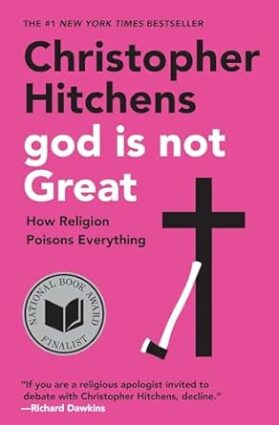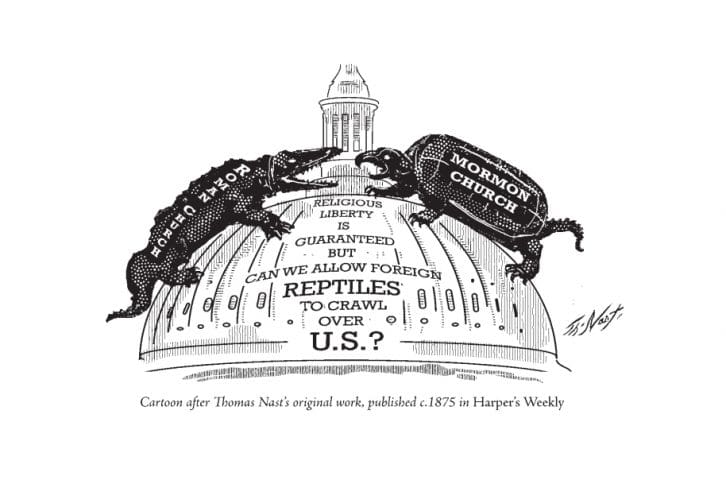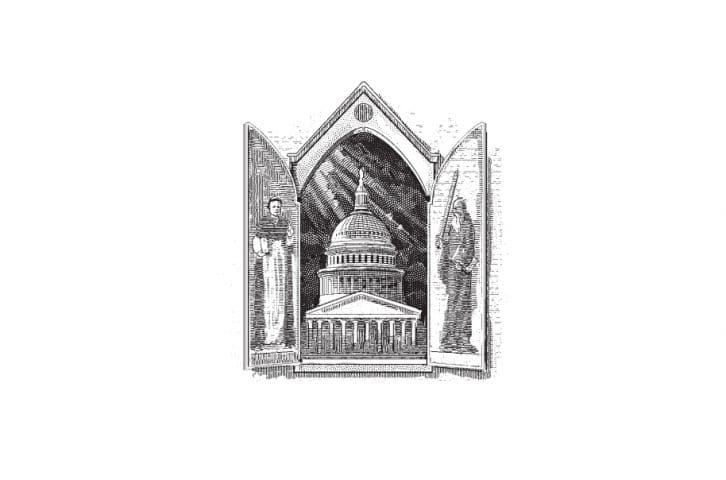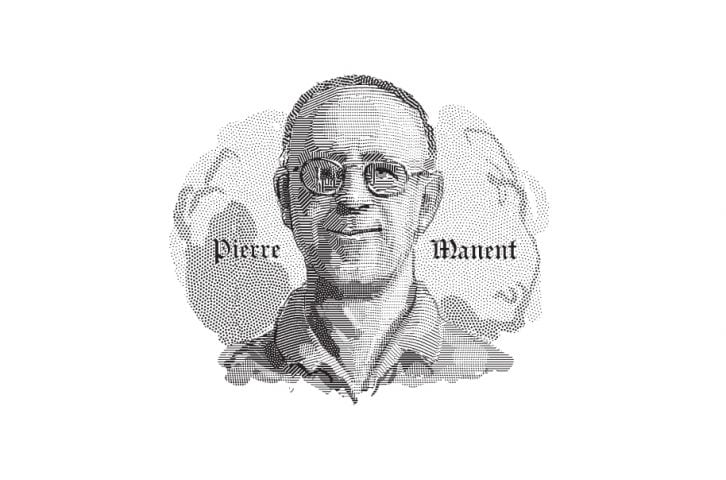Books Reviewed
Every talented writer is entitled to be a bore on at least one subject, but where religion is concerned Christopher Hitchens abuses the privilege. For years now, he has supplemented his prolific punditry and criticism with a stream of anti-theistic diatribes, and now these rivers of vituperation have pooled into a single volume, an omnium gatherum of God-bashing (although he insists on using the lower-case “g” throughout) that exceeds most of its predecessors in the felicity of its prose, but matches them in the tedium of its arguments. “I have been writing this book all my life,” Hitchens declares in the conclusion to God is Not Great: How Religion Poisons Everything, “and intend to keep on writing it.” One hopes that someone near and dear to him will have the courage to firmly suggest that he stop.
The book has been written with two main purposes in mind: to show that all religions are false, and to prove that their effects are near-universally pernicious. In each case, Hitchens’s argument proceeds principally by anecdote, and at his best he is as convincing as that particular style allows, which is to say not terribly. He succeeds in demonstrating that many faiths are frauds and many prophets have been fakers, that believers commit all sorts of terrible crimes and that Buddhists are no more pacific than Southern Baptists, and that the Bible is neither a work of academic history nor a biology textbook. Then again, I was convinced of these points already, and hoped that Hitchens would pick a fight on more contested territory, such as the origin and nature of spiritual experience, which seems a more likely source for man’s persistent religiosity than, say, the fear of thunderstorms or the stubborn refusal to crack open The Origin of Species. But like most apologists for atheism, he evinces little interest in the topic of religion as it is actually lived, preferring to stick to the safer ground of putting the godly in the dock and cataloguing their crimes against humanity.
In this vein, he is exhaustive but largely unpersuasive. I remain unconvinced, for instance, that religious practice has no significant effect on moral character, though all I have to support my intuition is a heap of academic studies suggesting that churchgoing boosts marital happiness, private generosity, and various other indicators of a life well lived, while Hitchens has the devastating rebuttal that Robert Ingersoll, the noted freethinker, was a better husband and father than the Catholic Evelyn Waugh. Similarly, I’m unpersuaded that the Catholic Church’s stance on birth control has been a major factor in the spread of AIDS around the world, though again I’m merely relying on statistics—African infection rates, for instance, are highest in heavily Protestant countries; most studies suggest that serious religious practice correlates with lower rates of risky sexual behavior, even among people already infected with HIV—while Hitchens has the irrefutable power of anecdote on his side, specifically a few dumb statements about condoms from Third World churchmen.
I’m also unconvinced that male circumcision is quite the species of totalitarianism that God Is Not Great makes it out to be, though I am perhaps suffering from what Hitchens, in his Marxist phase, would have described as “false consciousness.” Nor do I believe that the doctrine of hell has wrecked quite so many millions of childhoods as he claims (though he does have citations from James Joyce and Mary McCarthy on his side); or that religion has likewise ruined the act of coitus (a difficult thing to do, one might hazard) for untold numbers of believers; or that the difference between the Spanish Inquisition and the U.S. military chaplaincy is a matter of degree and not of kind. Although Hitchens may be entirely correct that an atheist need “never again confront the impressive faith of an Aquinas or a Maimonides,” because faith of “the sort that can stand up at least for a while in a confrontation with reason” no longer exists, I wish he had risked the confrontation, instead of writing an entire book about religion that includes exactly two quotations from religious intellectuals born since 1800, both taken from the same C.S. Lewis pamphlet.
* * *
It might be argued that the brevity of the book and the amount of ground it covers should excuse the less-than-rigorous fashion in which it advances its more controversial arguments. But the demands of brevity should clarify and hone, whereas Hitchens manages to be both short and sloppy. To dispense with both the Old and New Testament in 25 pages is a difficult task, but if he was limited by considerations of length he might have found better evidence for the fraudulence of the Christian witness than, say, the less-than-earthshattering revelation that non-canonical gospels circulated in the centuries after Christ; or the news that the well-known passage in the Gospel of John dealing with the woman taken in adultery was not part of the original Johannine text; or the self-evidently specious observation that the New Testament authors “cannot agree on anything of importance.” Hitchens might also have better disguised the fact that he seems to have consulted no New Testament authorities more distinguished than the latest publications from Elaine Pagels, the doyenne of the “lost gospels” industry, and Bart Ehrman, the ex-fundamentalist who abandoned Christianity once it became clear to him that there might have been actual human beings involved in the composition of its sacred texts.
Perhaps one should be grateful when Hitchens cites any authority at all, since his artful prose is forever rushing on to the insult and skipping the argument, and sometimes the facts as well. He claims that Mel Gibson’s The Passion of the Christ stars a “lead actor who was apparently born in Iceland or Minnesota,” a jibe calculated to amuse anyone who’s never set eyes on Jim Caviezel, the lead actor in question, who looks exactly like the dark-haired, dark-skinned Italian-Slovak-Irish mongrel he is. Of the Gospels themselves, Hitchens notes that “the book on which all four may possibly have been based, known speculatively to scholars as ‘Q,’ has been lost forever, which seems distinctly careless on the part of the god who is claimed to have ‘inspired’ it”—a good line that reveals at best a passing acquaintance with biblical scholarship, since the hypothetical Q is only envisioned as a source for Matthew and Luke, not Mark and certainly not John.
* * *
Every book has its errors, of course, but few are quite so tendentious in their interpretation of the facts they manage to get right. Like an overzealous Christian searching pagan texts for anything that could be construed as foreshadowing Christ’s coming, Hitchens scours the record of man’s inhumanities to man for any hint that they might have been motivated by piety, prophecy, or dogma. No atrocity has been committed and no tyranny established, if you believe his theocentric history of violence, that did not have religion at its root somehow.
This would seem a rather difficult case to make, since a cursory reading of history suggests that loyalty to one’s kin, one’s tribe, and one’s nation—not to mention sundry political ideologies—has sparked at least as much violence as any theological controversy. But fortunately for Hitchens’s polemic, religion is so woven into human affairs that nearly every war contains some religious element for his monomania to batten on. And perhaps some readers will even be persuaded by, for instance, his peculiar suggestion that the Hutu-on-Tutsi carnage in Rwanda had less to do with ethnic grievances and the pernicious legacy of Victorian Europe’s racial theories than with some minor Marian visionaries, whose prophecies, which included dire and all-too-accurate predictions of imminent mass murder, were briefly co-opted by Hutu thugs.
More likely, though, the reader will come away unpersuaded of anything save the self-evident truth of the matter, which is that human beings, being a clannish and quarrelsome lot, tend to find all sorts of things to fight over, and that nearly every aspect of human affairs can serve as a powerful spur to actions both heroic and deplorable. So religion produces both Torquemada and Dorothy Day; philosophy spurs Socrates to die for truth and Heidegger to prostitute himself for Hitler; science cures polio and speeds our missiles on their way; the bonds of family provide the foundation for innumerable happy childhoods, but also for the Wars of the Roses. None of this is to excuse the crimes of religious believers; it’s merely to suggest that the line between good and evil runs through every aspect of human affairs, and denouncing belief in God for poisoning the world is as absurd as denouncing “democracy” because it has empowered tyrants from Hitler down to Hugo Chavez, or “equality” because its partisans have included the Jacobins, the Khmer Rouge, and the KGB.
Of this last objection, at least, Hitchens seems well aware, and he devotes an entire chapter to arguing strenuously that both the Nazis and the Communists were effectively religious and effectively theocratic, their secular experiments poisoned by religion. But with this move he begins sawing off the very branch he occupies, since if faith tends to infect even secular politics, then what separates Hitchens from his religious enemies?
* * *
The absence of ideology, he would doubtless claim, and the commitment to skepticism and humanism, “free thought” and above all Science. But Science is not a moral teacher, and Hitchens is nothing if not a moralist, passionately invested in such notions as universal human rights, the wastefulness of violence, the particular inviolability of children, and so forth. Where he finds these principles, I am uncertain, but then he seems to be perplexed as well, given how quickly his attempt to apply evolutionary theory to the thorny problem of abortion collapses into unfortunate-sounding appeals to “creative destruction” and “the pitilessness of nature.”
This detour into Social Darwinism is mercifully brief, and for the most part Hitchens hews faithfully to Thomas Jefferson’s famous attempt to carve all the miracles out of the Gospels and leave the ethical teaching intact. I do not mean to give offense in calling Hitchens a quasi-Christian moralist, but in his better moments that is what he plainly is—a true believer in the branch of the Enlightenment tradition that is epistemologically materialist but otherwise takes its cues from Christianity. The trouble is that this two-step contains a certain contradiction, which is why liberalism has tended to lurch in one direction or another ever since—toward a spineless relativism on the one hand or a scientistic utopianism on the other, with New Testament morality the first thing to be jettisoned in either case.
* * *
Hitchens’s own temptations lie in the latter direction. Though he casts himself as a chastened ex-Marxist, he slips all too easily into a boasting utopianism. There is the dream of near-immortality, thanks to “stupendous advances in medicine and life extension, derived from work on our elementary stem cells.” There is the usual atheistic claptrap about how the “undreamed of vistas inside our own evolving cortex, in the farthest reaches of the known universe, and in the proteins and acids which constitute our nature” are a suitable replacement for the inspiration and consolation associated with religion. And inevitably, there is the fantasy of a sexual utopia, since “the divorce between the sexual life and fear, the sexual life and disease, and the sexual life and tyranny, can now at last be attempted, on the sole condition that we banish all religions from the discourse.” (This last bit is the kind of nonsense that only an intellectual could believe—that religion, rather than biology and human nature, is responsible for making sex physically and emotionally perilous, or linking promiscuity with disease, or intertwining the personal and the political.)
At one point, summoning his readers to the salons and barricades of a new Age of Reason, Hitchens adds the caveat that “only the most naive utopian can believe that this new humane civilization will develop, like some dream of ‘progress,’ in a straight line.” This sounds admirably humble, until you read the next sentence—”we have to first transcend our prehistory, and escape the gnarled hands which reach out to drag us back to the catacombs and the reeking altars”—and realize that the only people standing between us and this “new humane civilization” are the unenlightened types who don’t agree with Christopher Hitchens about the ultimate purpose of human affairs.
We’ve heard this kind of talk before—transcending the past, building a new humane civilization, escaping the outworn moralities and metaphysics of yore—and its results have tended to be unhappy for those unfortunate enough to be identified with the “prehistory” that needs to be transcended. Perhaps a more modest utopianism will be less pernicious than its predecessors; perhaps Hitchens really means it when he protests, in between the insults, that he only dislikes religion because it won’t leave him well enough alone. But there’s nothing, either in recent history or in the pages of this smug, incurious book, to give one any confidence of that.






